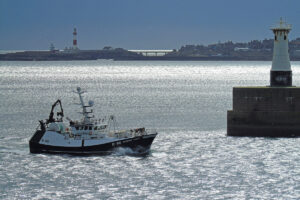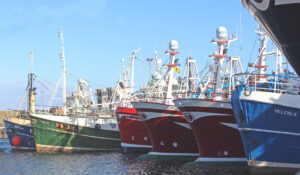High consumer demand for limited whitefish supplies
The small amount of whitefish available in Scotland last week secured good prices as buyers strived to meet contract requirements from key consumers, including supermarkets, in the run-up to Easter week, reports David Linkie.

Guiding Light approaching Peterhead last week, where only a small number of whitefish boats landed. (Photo: Ryan Cordiner)
The consistent prices on offer last week continued the upward trend that started the previous week, after demand for whitefish plummeted on Tuesday, 26 March following the announcement of stringent measures to combat the Covid-19 pandemic.
Prices on the Shetland electronic auction last week were particularly good in the circumstances, with whiting making up to £4.15, cod £5.15, haddock £4.90 and megrim £12 per kg.
A marked scarcity of supplies was the reason for keen prices in a complex trading situation, in which the balance between supply and demand remains fragile for a variety of reasons.
Some processors have furloughed their workforce, and therefore cannot re-engage them for three weeks, so filleting capacity is significantly reduced and unable to handle normal supply levels.
While conscious of the importance of processors being able to honour contractual requirements for long-term continuity, skippers are also wary of creating a large deficit in expenses by landing to a potentially weak market that would barely cover leasing costs.
Boats restrict landings to boost prices
Markets remain volatile amid uncertainty
Producer organisations are trying to restrict whitefish landings to match demand, in a bid to keep up prices and keep boats at sea as the coronavirus crisis hits markets, reports Tim Oliver.

Whitefish and prawn boats tied up at Fraserburgh on Thursday of last week.
Most prawn boats, crabbers and scallopers are tied up, but many whitefish boats are trying to keep working, albeit on a restricted basis and with volatile markets and prices.
In Scotland, the Shetland PO is operating an effort restriction scheme during April. The Scottish Fishermen’s Organisation (SFO) has not issued/allocated any pool quota for the month, and has less than a sixth of its member vessels at sea.
The Shetland PO, which has 34 members in total, has divided its 23 whitefish members into two groups and has allocated each group 15 days during the 30 days of April.
Chief executive Brian Isbister said that the aim was to try to match landings to what the local buyers were advising market demand would be.
“The Shetland fleet lands by and large into Shetland, so it’s a bit easier for us to manage an effort scheme than most other places,” he told Fishing News.
“We decided to reduce our fishing effort to half what it would normally be. The only fair way we could contemplate was to divide the membership into two groups, which is what we’ve done for the month of April – so 15 days for each group. It’s pretty brutal mathematics, but at least we can try to give members some sense of assurance that if we can keep the market going, we can avoid a boom and bust situation.
“Oversupply leads to very, very poor prices. We saw that at the beginning of last week, when we had a couple of heavy market days which coincided with heavy markets at Peterhead, and with all the uncertainty, prices just collapsed.
“Since then, we’ve tried to regulate all our landings, and that seems to be working. We operate quite a big pool quota through the PO, so we can manage things to that extent.”
He said that things were changing day by day, and they were trying to work with the local buyers ‘so we don’t oversupply what precarious market there is’.
The members accepted that the scheme was in the best interests of everyone collectively, but ‘if circumstances change, I’m not sure we can hold the guys forever to this type of management’.
“I suppose, at the end of the day, it’s the job of the PO to deliver supply to meet market demand, and that’s what we’re trying to do.”
He said that a comparison between the very high landings and very poor prices at start of the previous week, before the scheme started, and the high prices in the last few days, with very low landings, showed that the restrictions were working.
“It’s a bitter pill to swallow, but we’re just trying to ensure everybody’s being treated fairly.”
He said that the Shetland markets at Lerwick and Scalloway support a broad range of buyers on the UK mainland, and a lot of the fish, such as megrim and monkfish, goes into the French and Spanish markets. It was ironic that these markets were taking so much of the Shetland catch, despite having been subject to tight lockdowns for some time.
“The French and Spanish supermarket systems seem to be far more tuned into supplying fresh fish than ours – but, to be fair, things are moving in this country after all the initial uncertainty created by the lockdown circumstances. I think people are learning how to facilitate working inside the new regime.”
National effort
Marine Scotland had proposed a national effort scheme, but the Scottish industry overall had rejected it, said Brian Isbister, because there were too many different interests and fisheries for it to be workable, compared to the situation in Shetland.
“There wasn’t the collective will to look at it from the whole industry point of view. There are lots of different interests and different fisheries underway at the moment – for example, this is seasonally the time to fish at Rockall, so limiting effort cuts across the logic of boats going there.
“The situation will change as we carry on, and a national effort scheme may or may not make sense in the future, but from our perspective here in Shetland, given the kind of market we have and the type of fishing we do, it just makes sense at the moment for us to try to restrict landings.”
The SFO, Scotland’s biggest PO, has not issued any pooled quota allocation to members for April, and is not leasing quota. At the beginning of the month, there were only 25 SFO boats at sea out of a membership of 160 vessels, and the SFO has closed its processing facilities at Fraserburgh and Uddingston for a minimum three-week period.
Chief executive John Anderson said the situation would be ‘kept under constant review’. Writing in the SFO monthly newsletter, he said there was no point in wasting the organisation’s resources at the risk of next to no return.
He said that throughout the Covid-19 crisis, Seafood Scotland, the Scottish industry’s marketing and promotions body, had been ‘working tirelessly’ with other seafood and wider food and drink bodies to try and get a grip on the situation.
“Among other things, they are working on a new domestic fish consumption campaign backed by the Scottish government. However, it is – perhaps unsurprisingly – difficult to establish a clear picture of demand from our own domestic processors, and without that, it will be extremely difficult to establish the new – and hopefully short-term – supply and demand equilibrium. Without that, the risk of a price crash brought about by excess effort remains real.”
The SFO chief pointed out that the Scottish government had already announced an aid package for the under-12m fleet, and an aid package for the processing sector was believed to be imminent. “Clearly there is a rationale for aid to be directed towards the over-12m sector also, and representations have been made to the Scottish government in that regard.”
SW POs and markets work together
In the South West, the three POs – South Western, Cornish and Interfish – are in regular contact with one another and with the markets at Newlyn, Brixham, Plymouth and further east at Shoreham.
Jim Portus of the SWFPO said that beamers are working short trips, with a rough pattern of three-day trips and three days in port. They are staggering trips to even out supplies throughout the week and to avoid big markets on Mondays and Fridays and slack markets mid-week.
Markets have reduced their staffing, and boats are being asked to keep boxes to 25kg so they can be handled by one man, instead of the normal 40kg boxes that need two to be handled safely.
Jim Portus told Fishing News last week that the markets were selling fish, although with reduced supplies, and that prices for hake, sole and monks were all up on the previous week on all the markets. “Some buyers have stopped working, but the remote electronic auctions at Brixham and Plymouth are continuing as usual,” he said.
“The inshore boats have been reluctant to fish in the easterly winds, but a lot started going back to sea on Wednesday, so we’re expecting more fish on the markets Thursday and Friday from the day-boat sector.
“The crabbing sector are completely tied up, and most of the scallopers have given up for the time being, with prices reduced dramatically – there’s not enough in it for anyone to operate profitably. It’s just about ‘tickover’ price being offered by the processors.
“The only thing that’s doing a roaring trade is door to door sales – the mobiles. Seafood Cornwall has had thousands of enquiries and a record number of new buyers, and the Call for Fish campaign at Plymouth is doing well.
“Mobile traders in Brixham are doing local deliveries. You have to order and pay in advance and then get a doorstep delivery, so you don’t have to interface with the fishmonger.”
He said one small chink of light was that there appeared to be some slight relaxation in the pipeline to the Continent.
“Shoreham sent fish to France on 31 March, and fish has gone from Brixham to Belgium each time there’s been a market. Samways has been transporting fish to the Continent, and some soles have gone to Belgium.
“Belgium has been sending fresh fish to France, which we thought had dried up, but there’s been a bit of a resurgence over the last few days – the embers of the trade are still bright, although it’s not a roaring fire.
“The crucial thing is we’re doing what we can to support our members at sea, and those that are tied up. We’re working with the CFPO and Interfish PO to co-ordinate our responses to DEFRA.
“We’re also talking to the markets on a regular basis, to ensure we’re all singing from the same hymn sheet, loudly and clearly, to make sure we get the message through to DEFRA and we get this tailored scheme.”








